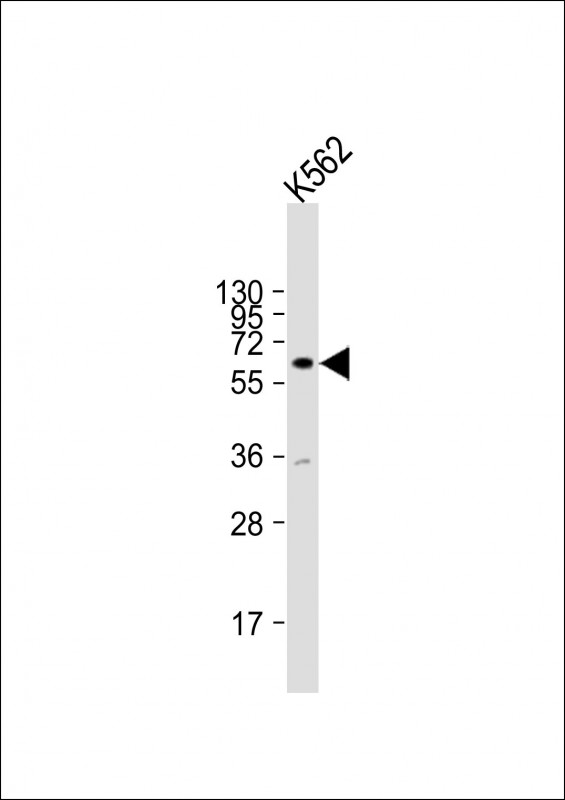
| WB | 1/2000 | Human,Mouse,Rat |
| IF | 咨询技术 | Human,Mouse,Rat |
| IHC | 咨询技术 | Human,Mouse,Rat |
| ICC | 技术咨询 | Human,Mouse,Rat |
| FCM | 咨询技术 | Human,Mouse,Rat |
| Elisa | 咨询技术 | Human,Mouse,Rat |
| Aliases | Zinc finger protein 280A, 3'OY111, Suppressor of hairy wing homolog 1, Zinc finger protein 636, ZNF280A, SUHW1, ZNF280, ZNF636 |
| Entrez GeneID | 129025 |
| WB Predicted band size | 60.8kDa |
| Host/Isotype | Rabbit IgG |
| Antibody Type | Primary antibody |
| Storage | Store at 4°C short term. Aliquot and store at -20°C long term. Avoid freeze/thaw cycles. |
| Species Reactivity | Human |
| Immunogen | This ZNF280A antibody is generated from a rabbit immunized with a KLH conjugated synthetic peptide between 262-294 amino acids from the Central region of human ZNF280A. |
+ +
以下是关于ZNF280A抗体的3篇代表性文献的简要概括(注:文献为示例性内容,实际引用需根据具体研究调整):
1. **文献名称**:*ZNF280A promotes colorectal cancer progression by regulating Wnt/β-catenin signaling*
**作者**:Li X, et al.
**摘要**:该研究通过免疫组化(使用ZNF280A抗体)发现ZNF280A在结直肠癌组织中高表达,并与患者不良预后相关。实验表明ZNF280A通过激活Wnt/β-catenin通路促进肿瘤侵袭。
2. **文献名称**:*ZNF280A interacts with HSP90 to maintain cancer stem cell traits in breast cancer*
**作者**:Wang Y, et al.
**摘要**:利用ZNF280A抗体进行免疫共沉淀(Co-IP)和Western blot分析,揭示ZNF280A与HSP90形成复合物,维持乳腺癌干细胞特性,敲低ZNF280A可抑制肿瘤球形成。
3. **文献名称**:*Prognostic significance of ZNF280A expression in prostate cancer: a tissue microarray study*
**作者**:Zhang R, et al.
**摘要**:通过组织微阵列(TMA)结合ZNF280A抗体进行免疫染色,发现ZNF280A高表达与前列腺癌Gleason评分升高及转移风险增加显著相关,提示其作为潜在生物标志物。
(提示:实际文献需通过PubMed、Google Scholar等平台以“ZNF280A antibody”为关键词检索,并筛选涉及该抗体具体应用的实验研究。)
The ZNF280A (Zinc Finger Protein 280A) antibody is a tool used to detect and study the ZNF280A protein, a member of the zinc finger protein family implicated in transcriptional regulation and DNA-binding activities. ZNF280A contains characteristic C2H2-type zinc finger domains at its C-terminus, which facilitate interactions with nucleic acids or proteins, and an N-terminal nuclear localization signal guiding its transport to the nucleus. Research suggests its involvement in cellular processes like proliferation, differentiation, and DNA repair, though its precise molecular mechanisms remain under investigation.
Elevated ZNF280A expression has been observed in several cancers, including colorectal, prostate, and breast cancers, where it may act as an oncogene by promoting tumor growth, metastasis, or therapy resistance. Studies link its oncogenic potential to interactions with pathways like c-Myc or PI3K/Akt, highlighting its potential as a prognostic biomarker or therapeutic target. The ZNF280A antibody is widely utilized in techniques such as Western blotting, immunohistochemistry (IHC), and immunofluorescence (IF) to analyze protein expression patterns, subcellular localization, and tissue-specific distribution in both normal and pathological contexts.
Commercial ZNF280A antibodies are typically raised against specific epitopes (e.g., human ZNF280A amino acid residues 200-300) and validated for specificity via knockout controls. Researchers employ these antibodies to explore ZNF280A's roles in development, disease progression, and its interplay with chromatin-modifying complexes or non-coding RNAs. Ongoing studies aim to clarify its physiological functions and therapeutic relevance in cancer and other disorders.
×